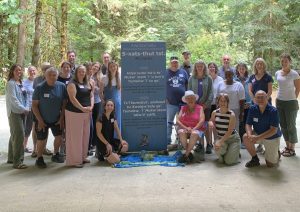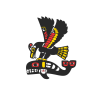Drought Response
Drought Response in the Cowichan Valley
Throughout the Cowichan watershed, from the headwaters above Cowichan Lake, to the Quw'utsun (Cowichan) and Xwulqw'selu (Koksilah) Sta'lo' (Rivers), to the many critical subwatersheds and tributaries (e.g. Somenos/Quamichan), right down to the estuary at Cowichan Bay, the impacts of longer drier summers are being witnessed. These climate impacts are exacerbated by decades of land use practices and colonial decision-making that did not prioritize the important interconnection between healthy watersheds and healthy communities.
The CWB is prioritizing a few large efforts to address the situation, while partnering with many other organizations working throughout the watershed.
- i) Rebuilding the Cowichan Lake Weir - See cowichanlakeweir.ca
- ii) Koksilah Watershed Planning - See koksilahwater.ca
- iii) Cowichan River Fish-Kill - Community Response - read below.
What's the Latest?
The Cowichan Watershed Board is warning of possible ecological impacts this summer, as river conditions mirror 2023, when over 100,000 fish died due to low summer river flows, warming water temperatures, and declining water quality.
Please see the joint media release on this topic from Cowichan Tribes, Cowichan Valley Regional District, and the CWB as of July 14 2025. Find related media interviews on our News page.
Since 2023, the CWB has facilitated a collaborative fish kill response team including federal, provincial, indigenous, and local expertise, supported by internationally respected water quality engineer, Dr. Ken Ashley. The group meets regularly, and is collectively implementing what has been called Canada’s most advanced river monitoring system, (including 24/7 data at six sites) to guide actions. Read about those collaborative efforts here: Collaboration for Salmon Resilience: From Crisis to Opportunity - a Cowichan Story
Emergency measures
The coalition is implementing emergency measures to safeguard the Cowichan River’s aquatic life. Key actions currently in effect (as of July 2025) include:
- Town of Lake Cowichan wastewater effluent inputs to the river have been reduced to half, with releases happening overnight in an attempt to reduce algae growth
- Conserving lake water by reducing spring flows from the weir in an attempt to maintain higher summer baseflows
- Implementation of early fishing closures to reduce stress on fish populations
- Conducting field research to identify, protect and improve “cold water refugia” areas, which are extremely important to fish during warm water conditions
While every available action is being utilized, without rain or cooler temperatures, it may not be enough. Climate change predictions for the region are holding true, and this crisis situation is likely to reoccur almost annually until the Lake Cowichan weir is replaced to store more water. Learn more at cowichanlakeweir.ca.
How can you help?
If you see fish in stress, such as stranded in drying river beds, report it to:
- Department of Fisheries and Oceans Canada’s 24/7 Observe, Record and Report (ORR) hotline at 1-800-465-4336 or via email at [email protected].
If you see pollution entering a water body, report it to:
- Report All Poachers and Polluters (RAPP) Provincial hotline, using the online form (forms.gov.bc.ca/environment/rapp) or 1-877-952-7277.
- Environment Canada BC Region - Provincial Emergency Program 1-800-663-3456. (This is the federal agency that handles enforcement of the deleterious substances section of the Federal Fisheries Act).
If you suspect an unauthorized use (or waste) of water, you can submit a Natural Resource Violation Report here: https://forms.gov.bc.ca/
Conserve water at home. Particularly limit outdoor watering, the largest source of residential water use. Let lawns go for gold, and remember that it's hip to fix a drip!
Avoid swimming in the river during low flows to protect fragile fish habitats.
i) Cowichan Lake Weir - "Weir" Taking Care of our Watershed!
As part of the efforts to mitigate the effects of drought, significant work is underway to rebuild the Cowichan Weir. Weir Ready! This project aims to increase the weir's capacity to store water during the winter months, which can then be released during extended dry spells, ensuring a more consistent flow in the river. This enhanced management strategy is crucial for maintaining the health of the aquatic ecosystem and supporting the survival of fish species during periods of low summer flows. Read more.
CWB partners with Cowichan Lake weir in background. Photo by Graham Twomey.
ii) Koksilah Watershed Planning
Low water levels are a recurring challenge in the Cowichan Valley. In recent years, summer flows in the Koksilah River have reached critically low levels precisely when water demand peaks. This situation poses a significant threat to the survival of both resident and anadromous salmonid species, jeopardizing the entire aquatic ecosystem.
As a result, Cowichan Tribes and the Province have begun work on long-term solutions through a community-based Xwulqw'selu Watershed Planning Process. Learn more here.
In addition, to address drought during the short term, multiple organizations have formed the Koksilah Low Flow Working Group - a communications forum to improve support and understanding between water users, regulators, researchers, and others. Through this avenue, the Cowichan Watershed Board is joining with other partners to encourage residents and businesses in this watershed to do everything they can to reduce outdoor water use, which is the largest drain on both surface and groundwater. Using timers and efficient irrigation, as well as by letting all lawns go 'golden' (dormant), we encourage everyone to strive to reduce water use by 50%. This is ambitious, but reflects the significant irrigation reductions that local farmers are dealing with many years now due to low flows that threaten critical fish habitat, and irrigation is restricted through a voluntary schedule, or sometimes halted by legal order.
 iii) Cowichan River Fish Kill - Community Response
iii) Cowichan River Fish Kill - Community Response
In the summer of 2023, Cowichan Lake suffered a devastating fish die-off. Lower water levels, rising temperatures, and altered water chemistry combined to create lethal conditions for aquatic life. This resulted in the loss of 84,000 steelhead juveniles and countless numbers from other fish species, a devastating blow to the river's ecosystem. The unprecedented die-off underscored the urgent need for improved environmental management and proactive measures to protect the fragile aquatic habitats.
Cowichan River Water Quality Updates 2024
(Note that similar data is being collected in 2025, but summary reports are not available.)





 Email
Email



